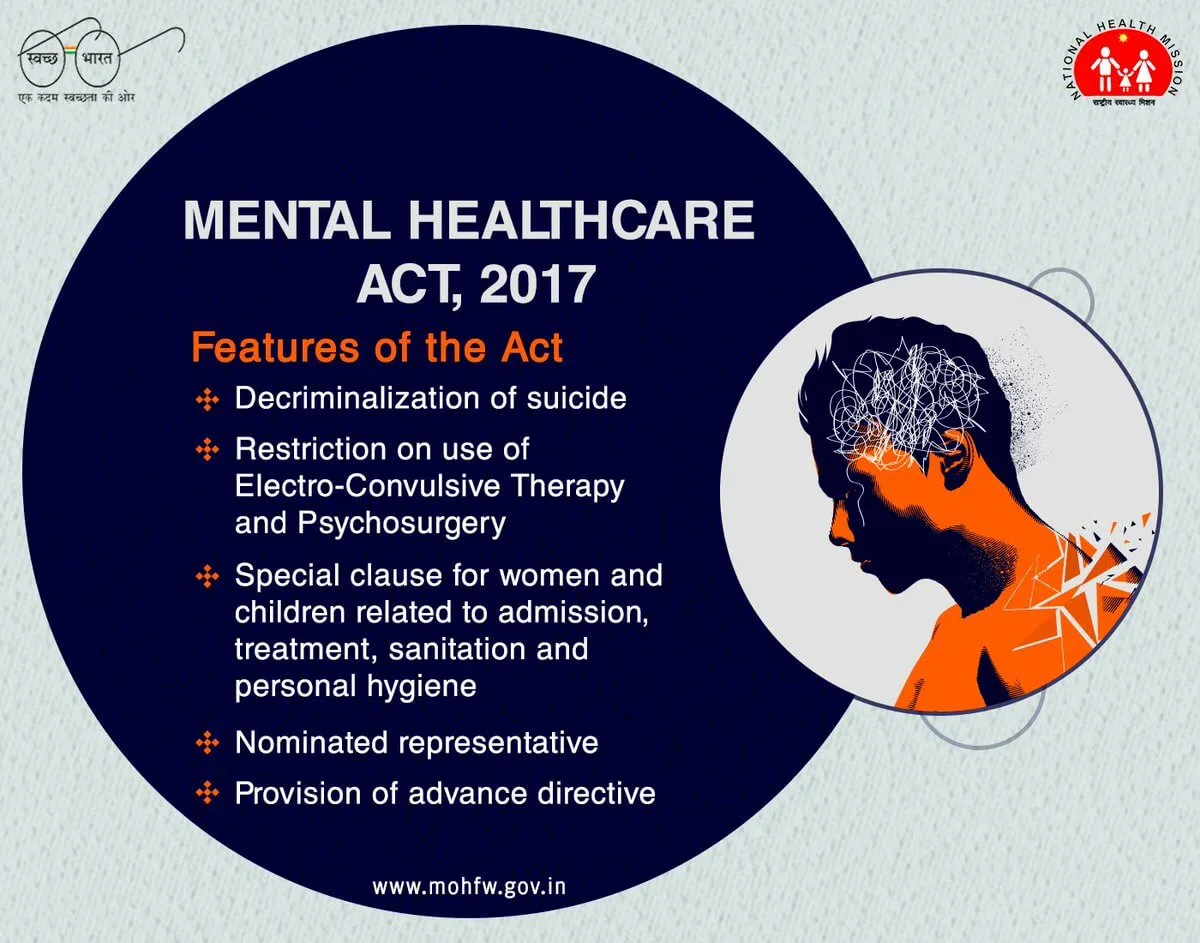Social Issues
Mental Healthcare Act, 2017
- 16 Feb 2023
- 7 min read
Prelims: NHRC, MHIs, Section 19, SDG 3.4, WHO’s Comprehensive Mental Action Plan 2013-2020, MANAS App.
Mains: Mental Healthcare Act, 2017, and Associated Challenges.
Why in News?
The National Human Rights Commission (NHRC) gas raised concern over the Deplorable Condition of many Mental Healthcare Institutions (MHIs) in India, violating Mental Healthcare Act (MHA), 2017.
- According to the NHRC, MHIs are “illegally” keeping patients long after their recovery, which not only violates Article 21 but also highlights failure of the Governments to discharge the obligation under various international Covenants relating to rights of persons with disabilities which have been ratified by India.
What is the Background MHA, 2017?
- Before MHA 2017, the Mental Healthcare Act, 1987 existed, which prioritized the institutionalization of mentally ill people and did not afford any rights to the patient.
- The Act provided disproportionate authority to judicial officers and mental health establishments to authorize long-stay admissions, often against the informed consent and wishes of the individual.
- Consequently, several persons continue to be admitted and languish in mental health establishments against their will.
- It embodied the ethos of the colonial-era Indian Lunacy Act of 1912, which linked criminality and madness.
- Asylums were places where “abnormal” and “unproductive” behaviour was studied as an individual phenomenon, isolating the individual from society. The intervention is meant to correct an inherent deficit or “abnormality”, thereby leading to “recovery”.
- In 2017, the MHA dismantled the clinical heritage attached to asylums.
What is MHA 2017?
- About:
- This Act defined mental illness as “a substantial disorder of thinking, mood, perception, orientation, or memory that grossly impairs judgment, behaviour, capacity to recognize reality or ability to meet the ordinary demands of life, mental conditions associated with the abuse of alcohol and drugs.
- It also provides the right of patients to access facilities that include rehabilitation services in the hospital, community, and home, sheltered and supported accommodation.
- It regulates the research on PMI (Person with Mental Illness) and the use of neurosurgical treatments.
- Rights under MHA:
- Right to Make an Advance Directive (Patient can state on how to be treated or not to be treated for the illness during a mental health situation).
- Right to Access to Healthcare Services.
- Right to free of cost healthcare services.
- Right to live in a community.
- Right to protection from cruel, inhuman and degrading treatment.
- Right not to be treated under prohibited treatment.
- Right to equality and non-discrimination.
- Right to information.
- Right to confidentiality.
- Right to legal aid and complain.
- Attempt to Commit Suicide not an Offence:
- A person who attempts to commit suicide will be presumed to be “suffering from severe stress’’ and shall not be subjected to any investigation or prosecution.
- The act envisages the establishment of Central Mental Health Authority and State Mental Health Authority.
What are the Associated Challenges with the Implementation?
- Absence of MHRBs:
- The majority of the States have not established State Mental Health Authority and Mental Health Review Boards (MHRBs), and many States have not notified minimum standards which are meant to ensure the quality of MHIs.
- MMHRBs are bodies that can draft standards for mental healthcare institutes, oversee their functioning and ensure they comply with the Act.
- The absence of MHRBs renders people unable to exercise rights or seek redressal in case of rights violations.
- The majority of the States have not established State Mental Health Authority and Mental Health Review Boards (MHRBs), and many States have not notified minimum standards which are meant to ensure the quality of MHIs.
- Poor Budgetary Allocation:
- Poor budgetary allocation and utilization of funds further create a scenario where shelter homes remain underequipped, establishments are understaffed, and professionals and service providers are not adequately trained to deliver mental healthcare.
- Stigma:
- People are either put in these establishments by families or through the police and judiciary.
- In many cases,families refuse to take them because of the stigma attached to incarceration or the idea that the person is no longer functional in society.
- Gender discrimination plays a role here: women are more likely to be abandoned due to “family disruption, marital discords and violence in intimate relationships.
- Lack of Community Based Services:
- While Section 19 recognises the right of people to “live in, be part of, and not be segregated from society,” there have been no concrete efforts towards implementation.
- The dearth of alternative community-based services -in the form of homes for assisted or independent living, community-based mental healthcare services, and socio-economic opportunities – further complicates access to rehabilitation.
What are the Initiatives Related to Mental Health?
- Global Initiatives:
- Indian Initiatives:
Way Forward
- The Act must be reviewed regularly to ensure that it remains effective in addressing the changing needs of individuals with mental health issues.
- Additionally, resources must be made available to ensure that the Act is adequately implemented and enforced.
- There must be ongoing efforts to reduce the stigma associated with mental illness, to increase public awareness of mental health issues, and to promote mental health and well-being.







